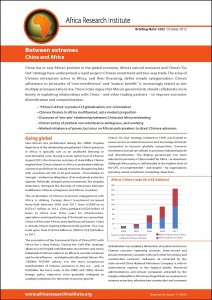As China prepares for a leadership transition amidst an economic slowdown, Africa Research Institute (ARI) examines the multifaceted relationship with Africa. In its latest Briefing Note, “Between extremes”, ARI argues that popular depictions of Sino-African relations are misleading – and suggests that African governments need to collaborate more keenly to exploit ties with China.
China’s ever-growing presence in Africa is typically cast as an unalloyed blessing or neo-colonialist curse. Polarised depictions are too simplistic. The diversity of interaction between Chinese enterprises and African countries is frequently overlooked. Burgeoning diplomatic and commercial links with states not rich in natural resources undermine allegations of a purely extractive agenda.
The acceleration of Chinese investment in Africa is striking – FDI increased thirty-fold between 2003 and 2011, from US$491m to US$14.7 billion. The focus of investment is rapidly becoming broader. In 2012, China pledged US$20 billion of loans to African countries over three years for infrastructure, agriculture and manufacturing. If the funds are committed, China will become the continent’s principal financial backer.
The vast majority of Chinese funding to Africa is commercial. Loans used to secure natural resource concessions or infrastructure contracts are almost always offered at non-concessional rates. While state-backed “policy banks” promote government interests with concessional financing packages, aid is a modest proportion of total funding – an estimated US$1.6 billion in 2009. The conduct of most non-state financial institutions from communist China which are active in Africa differs little from that of their capitalist western counterparts. Banks take advantage of China’s colossal foreign exchange reserves and low global interest rates to offer competitive – not state-subsidised – credit to Chinese companies and African governments.
China is Africa’s largest bilateral trading partner – two-way trade grew from US$10.6 billion in 2000 to US$166 billion in 2011. Oil, gas, metals and minerals from five countries account for more than three-quarters of African exports to China. Imports from China are far more diverse –by destination and product. The majority of imports are manufactured goods. Trade has not been accompanied by significant skills development, technology transfer or productivity improvements in Africa.
The discourse of the “mutual benefit” of economic relations between China and Africa is attracting increased scrutiny. The Beijing government must do more to reconcile official rhetoric with the delivery of more discernible – and widespread – benefits. The frequently mentioned transfer of jobs from China to Africa remains illusory. A more prevalent reality in Africa is the collapse of small and medium enterprises under pressure from cheap imports. According to one recent study, competition from Chinese imports may have cost the South African economy 78,000 industrial jobs in 2001-10.
China’s unwavering commitment to non-interference in the internal affairs of sovereign nations is undergoing subtle redefinition. In Sudan, the magnitude of China’s economic stake has forced the Beijing government to adopt a more prominent diplomatic role. In 2012, Chinese personnel were included in six of seven United Nations’ peacekeeping missions. Since December 2008, Chinese warships have participated in joint “anti-piracy” escort duties. The need to protect Chinese investments will render the definition of non-interference increasingly ambiguous. “There is inevitably a marked imbalance of power in Sino-African relations” says Jonathan Bhalla, Research Manager at ARI. “As is true of all foreign powers, national self-interest guides China’s engagement in Africa – not altruism. In order to improve their bargaining power, African governments need to work together more effectively. The responsibility for converting trade and investment from China into more diversified economies, sustainable growth and job creation rests squarely with African policymakers”.
Notes to editors:
Africa Research Institute is a non-partisan think-tank based in London. Our mission is to draw attention to ideas that have worked in Africa, and to identify new ideas where needed.
Between extremes: China and Africa can be downloaded from the Africa Research Institute website: http://bit.ly/SdytYi












